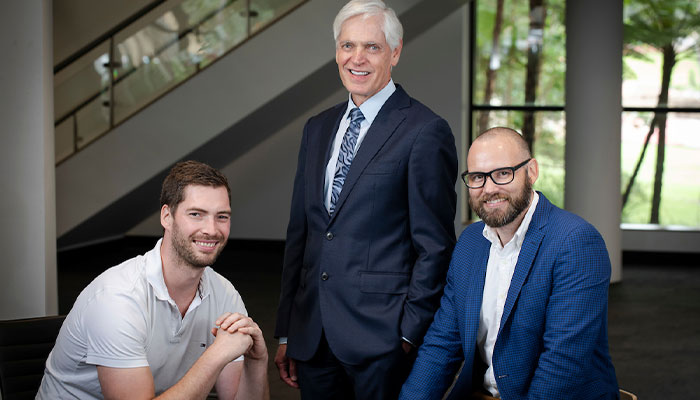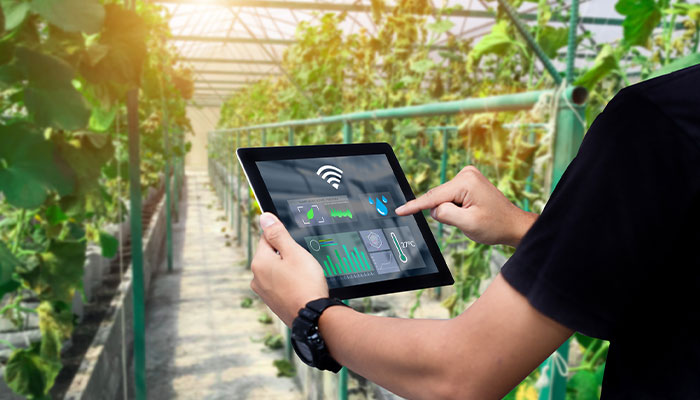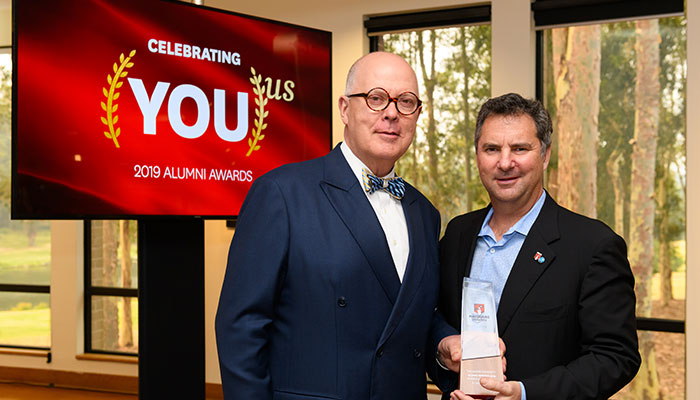“Hey Google, do I need to wear a mask in here?” Imagine if your personal digital assistant could identify traces of COVID-19 in a room’s air, in real time, and tell you if you needed to take precautions.

Future focus: Research authors Dr Thomas Williams, Professor Sakkie Pretorius and Thom Dixon ... ensuring SynBio technologies are safe for the planet is key for Macquarie researchers. Photo credit: Michael Amendolia
Long a staple of science fiction, 'bio-informational' tools are poised to change the way we imagine, and interact with, the living world.
In a paper recently published in Nature Communications, Macquarie University’s Thom Dixon, Dr Thomas Williams and Professor Isak (Sakkie) Pretorius take an in-depth look at what enhancements may be coming to a biological system – say, a plant or animal – near you, and sooner than you might have thought.
And in thinking ahead, says Professor Pretorius, “We are also thinking about what will be needed to make sure these technologies are safe for the planet and what the legal and regulatory frameworks need to safeguard society from what the unintended consequences might be.”
It is our responsibility as researchers to imagine what might happen. That way we can guard against the possibility of causing harm through trying to do good.
At the Macquarie-based ARC Centre of Excellence in Synthetic Biology scientists are coming up with solutions to global agricultural, food production, manufacturing, healthcare and environmental challenges.
One of the underpinnings of Macquarie’s research framework is consilience – a term taken from biologist E.O. Wilson’s quest for a unified theory of knowledge, spanning from physics and biology to the humanities and social sciences.
For this reason, like Macquarie’s work throughout the ARC Centre of Excellence in Synthetic Biology, this paper is multi-disciplinary, drawing on the arts and social sciences to examine not just the technical aspects of such revolutionary technology, but the broader implications and potential risk/benefit, to make sure that when these technologies are operational, they are also fit for social and environmental purpose.
Lead author Thom Dixon says: “It is our responsibility as researchers to imagine what might happen, both technologically and more broadly. That way we can guard against the possibility of causing harm through trying to do good.”
Sentinel plants and thought-controlled medicine delivery
The 21st century so far has been a period in which satellites, sensors and medical devices have made remarkable advances, and collected staggering amounts of data. The key word, though, is 'collected' – and collection is a one-way process. Information has flowed from the built, natural and living environment into digital systems, with nothing flowing back.

Two-way communication: Imagine a grapevine that could send electrical pulses to a satellite, alerting the vineyard manager to turn the sprinklers on.
But this is beginning to change.
We are now at the point when technology can allow information to flow the other way – from digital systems into living organisms and systems. With the practices and techniques of synthetic biology now being integrated into ‘multiscale’ designs that allow two-way communication across organic and inorganic information systems, biological devices are being reimagined as advanced cyber-physical systems.
Imagine, for example, that a vineyard contains one grape vine – just one – that has an engineered biosensor in its DNA. If that plant was getting low on water, it could send electrical pulses to a satellite, alerting the vineyard manager that it was time to turn the sprinklers on. This solves the problems of both under- and over-watering, optimises water use, and could also optimise yield.
What if we could use engineered gut microbiota, controlled by thought, to release medication on time and in the correct amounts.
The same plant could also potentially monitor air quality. If our hypothetical grape vine was in, for example, the NSW Hunter Valley, where vineyards and coal mines share the land, a sentinel plant could alert both vineyard and mine management if pollutants were escaping.
Or to take another example – what if we could use engineered gut microbiota, controlled by thought (monitored by an EEG) to release medication on time and in the correct amounts? People who are paralysed would no longer need to depend on others being there at the right time when they needed medication.
Over time, this could even be integrated with wearables and smartphones, to enable more sensitive calibration of medication delivery in a far broader range of patients.
Bringing everyone on board for the future
These are technologies for which the potential is truly vast, but they might encounter resistance.
As the article points out, “It remains unclear how those sectors of the public who have traditionally taken an opposition stance to engineering biology will respond to treatments and vaccines that are a product of that discipline and practice.”
The consilience approach is needed to ensure that public concern is anticipated and addressed, Pretorious says.
He stresses that these technologies are not yet practicable. But, he argues: "We need to look 10 to 20 years ahead, so that we’re ready.
"By getting the legal and governance aspects right at the same time as we’re perfecting the science, we make sure we use the technology without risk of harm, because we’ve already thought that through."
Professor Sakkie Pretorius is Deputy Vice-Chancellor (Research) at Macquarie University.
Thom Dixon is a PhD candidate in the Department of Modern History, Politics and International Relations.
Dr Thomas Williams is a Research Fellow at the ARC Centre of Excellence in Synthetic Biology.



